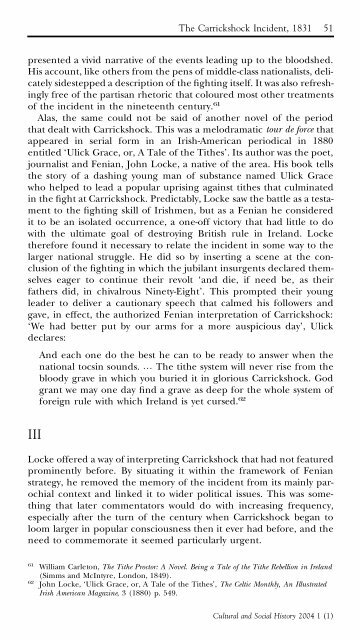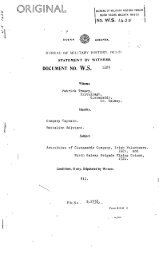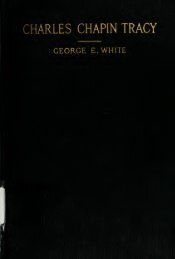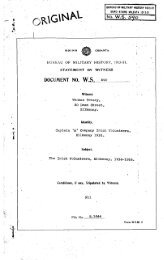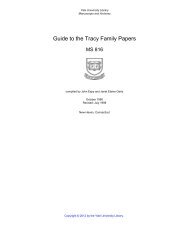The Carrickshock Incident, 1831: Social Memory and an Irish cause ...
The Carrickshock Incident, 1831: Social Memory and an Irish cause ...
The Carrickshock Incident, 1831: Social Memory and an Irish cause ...
Create successful ePaper yourself
Turn your PDF publications into a flip-book with our unique Google optimized e-Paper software.
<strong>The</strong> <strong>Carrickshock</strong> <strong>Incident</strong>, <strong>1831</strong> 51<br />
presented a vivid narrative of the events leading up to the bloodshed.<br />
His account, like others from the pens of middle-class nationalists, delicately<br />
sidestepped a description of the ghting itself. It was also refreshingly<br />
free of the partis<strong>an</strong> rhetoric that coloured most other treatments<br />
of the incident in the nineteenth century. 61<br />
Alas, the same could not be said of <strong>an</strong>other novel of the period<br />
that dealt with <strong>Carrickshock</strong>. This was a melodramatic tour de force that<br />
appeared in serial form in <strong>an</strong> <strong>Irish</strong>-Americ<strong>an</strong> periodical in 1880<br />
entitled ‘Ulick Grace, or, A Tale of the Tithes’. Its author was the poet,<br />
journalist <strong><strong>an</strong>d</strong> Feni<strong>an</strong>, John Locke, a native of the area. His book tells<br />
the story of a dashing young m<strong>an</strong> of subst<strong>an</strong>ce named Ulick Grace<br />
who helped to lead a popular uprising against tithes that culminated<br />
in the ght at <strong>Carrickshock</strong>. Predictably, Locke saw the battle as a testament<br />
to the ghting skill of <strong>Irish</strong>men, but as a Feni<strong>an</strong> he considered<br />
it to be <strong>an</strong> isolated occurrence, a one-off victory that had little to do<br />
with the ultimate goal of destroying British rule in Irel<strong><strong>an</strong>d</strong>. Locke<br />
therefore found it necessary to relate the incident in some way to the<br />
larger national struggle. He did so by inserting a scene at the conclusion<br />
of the ghting in which the jubil<strong>an</strong>t insurgents declared themselves<br />
eager to continue their revolt ‘<strong><strong>an</strong>d</strong> die, if need be, as their<br />
fathers did, in chivalrous Ninety-Eight’. This prompted their young<br />
leader to deliver a cautionary speech that calmed his followers <strong><strong>an</strong>d</strong><br />
gave, in effect, the authorized Feni<strong>an</strong> interpretation of <strong>Carrickshock</strong>:<br />
‘We had better put by our arms for a more auspicious day’, Ulick<br />
declares:<br />
III<br />
And each one do the best he c<strong>an</strong> to be ready to <strong>an</strong>swer when the<br />
national tocsin sounds. % <strong>The</strong> tithe system will never rise from the<br />
bloody grave in which you buried it in glorious <strong>Carrickshock</strong>. God<br />
gr<strong>an</strong>t we may one day nd a grave as deep for the whole system of<br />
foreign rule with which Irel<strong><strong>an</strong>d</strong> is yet cursed. 62<br />
Locke offered a way of interpreting <strong>Carrickshock</strong> that had not featured<br />
prominently before. By situating it within the framework of Feni<strong>an</strong><br />
strategy, he removed the memory of the incident from its mainly parochial<br />
context <strong><strong>an</strong>d</strong> linked it to wider political issues. This was something<br />
that later commentators would do with increasing frequency,<br />
especially after the turn of the century when <strong>Carrickshock</strong> beg<strong>an</strong> to<br />
loom larger in popular consciousness then it ever had before, <strong><strong>an</strong>d</strong> the<br />
need to commemorate it seemed particularly urgent.<br />
61 William Carleton, <strong>The</strong> Tithe Proctor: A Novel. Being a Tale of the Tithe Rebellion in Irel<strong><strong>an</strong>d</strong><br />
(Simms <strong><strong>an</strong>d</strong> McIntyre, London, 1849).<br />
62 John Locke, ‘Ulick Grace, or, A Tale of the Tithes’, <strong>The</strong> Celtic Monthly, An Illustrated<br />
<strong>Irish</strong> Americ<strong>an</strong> Magazine, 3 (1880) p. 549.<br />
Cultural <strong><strong>an</strong>d</strong> <strong>Social</strong> History 2004 1 (1)


